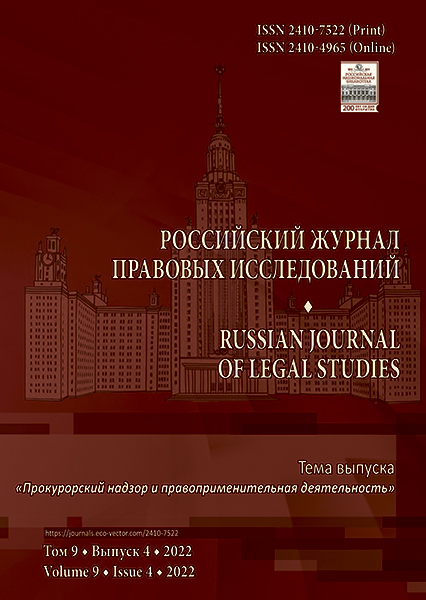The Civil Law Influence on the Tax Law Terminology and Legal Institutions
- 作者: Smolitskaya E.E.1
-
隶属关系:
- Voronezh State University
- 期: 卷 9, 编号 4 (2022)
- 页面: 71-76
- 栏目: Public law
- ##submission.dateSubmitted##: 21.02.2022
- ##submission.dateAccepted##: 29.11.2022
- ##submission.datePublished##: 27.01.2023
- URL: https://journals.eco-vector.com/2410-7522/article/view/101386
- DOI: https://doi.org/10.17816/RJLS101386
- ID: 101386
如何引用文章
详细
The purpose of this study is to analyze civil law’s influence on tax law terminology and legal institutions.
The article proves that the civil and tax law interconnection is based on unified “property algorithms,” which serve as the basis of most legal institutions of these branches of law. This permits civil law, as a relatively old and advanced branch of law, to have a great impact on tax law.
In addition, this article investigates the continuation of civil and tax legal regulation that is causing civil events and legal facts to be considered in tax rules.
The analysis of civil and tax legal terminology reveals a legal reception of the civil terms by the tax law, and some terms have changed their meanings. The author exposes problems caused by multiple meanings of legal terms and justifies the need for legal terms to be unambiguousness. It is been proven that the terminological field conception does not apply to solving the problems of civil law and tax law interconnection.
In the concluding part of this article, an authorial methodology for solving the terminological problems is offered. This methodology involves the forms of civil law’s influence on tax law.
全文:
作者简介
Elena Smolitskaya
Voronezh State University
编辑信件的主要联系方式.
Email: amylena@yandex.ru
SPIN 代码: 2902-4844
Candidate of Legal Sciences
俄罗斯联邦, Voronezh
参考
- Lebedev VA. Finansovoe pravo. Moscow: Statut (seriya “Zolotye stranitsy finansovogo prava”), 2000. 460 p. (In Russ.).
- Turgenev NI. Opyt teorii nalogov. U istokov finansovogo prava. Moscow: Statut (seriya “Zolotye stranitsy finansovogo prava”), 1998 432 p. (In Russ.).
- Chicherin BN. Sobstvennost’ i gosudarstvo. Saint-Petersburg: Izd-vo RKhGA, 2005. 824 p. (In Russ.).
- Genkin DM. K voprosu o sisteme sovetskogo sotsialisticheskogo prava. Sovetskoe gosudarstvo i pravo. 1956;(9):85–93. (In Russ.).
- Karaseva MV. Sovremennye tendencii razvitiya imushchestvennyh otnoshenij v finansovom prave. Finansovoe pravo. 2021;(7):7–11. (In Russ.).
- Smolitskaya EE. Grazhdansko-pravovye instituty, ponyatiya i terminy v nalogovom prave. Monografiya. Moscow: PROSPEKT, 2018. 176 p. (In Russ.).
- Karaseva MV. Nalogovoe pravootnoshenie: imushchestvennaya identichnost’ i problema adaptacii chastnopravovyh konstrukcij. Zakon. 2010;(11):57–67. (In Russ.).
- Yanzhul II. Osnovnye nachala finansovoi nauki: Uchenie o gosudarstvennykh dokhodakh. Moscow: Statut, 2002. 555 p. (In Russ.).
- Karaseva MV. Grazhdansko-pravovaya determinaciya nalogovogo prava: ponyatie i sushchnostnaya obuslovlennost’. Gosudarstvo i pravo. 2013;(7):36–45. (In Russ.).
- Karaseva MV. Vliyanie nalogovogo prava na grazhdanskoe: pravotvorcheskie kriterii i pravoprimenitel’nye paradigmy. Finansovoe pravo. 2020;(4):33–38. (In Russ.).
- Smolitskaya EE. Paradoks mnogoznachnosti terminov v grazhdanskom i nalogovom prave: pravovye problemy. Nalogi i finansovoe pravo. 2014;(3):248–253. (In Russ.).
- Vasil’eva TA. Kak napisat’ zakon. Moscow: Yurait, 2012. 148 p. (In Russ.).
- Sviridova EN. Za tochnost’ i edinstvo terminologii v ugolovnom sudoproizvodstve. Tr. VNIISZ. Moscow, 1977;(9):227–228. (In Russ.).
- Khizhnyak SP. Yuridicheskaya terminologiya: Formirovanie i sostav. Saratov: Izd-vo Sarat. un-ta, 1997. 136 p. (In Russ.).
- Bogach R, Karaseva MV. Nalogovo-pravovaya terminologiya v kontekste grazhdanskogo zakonodatel’stva Rossii i Chekhii. Vestnik Voronezh. gos. universiteta. Seriya: Pravo. 2015;(2):68–74. (In Russ.).
补充文件






